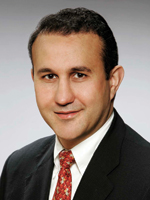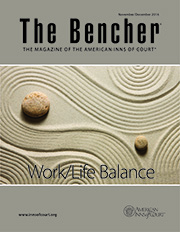ABA Seeks to Enforce Political Correctness
The Bencher—November/December 2016
By Francis G.X. Pileggi, Esquire

 During the nearly two decades that I have written this ethics column, I have eschewed controversial topics. Not this time.
During the nearly two decades that I have written this ethics column, I have eschewed controversial topics. Not this time.
In August, the American Bar Association adopted a new Model Rule of Professional Conduct 8.4(g), which creates a new definition for discrimination against certain protected classes. The Model Rules approved by the ABA are typically adopted by each state at which time a violation of any rule could subject a lawyer to penalties that include disbarment or suspension from the practice of law.
It is a violation of the new Rule 8.4(g) to engage in discrimination based on “race, sex, religion, national origin, ethnicity, disability, age, sexual orientation, gender identity, marital status, or socioeconomic status in conduct related to the practice of law.” Discrimination includes “verbal” conduct that “manifests bias.”
One leading expert on constitutional law and legal ethics, Professor Ronald Rotunda, has written recently in The Wall Street Journal that the new rule is in conflict with the First Amendment right to free speech. He uses the example of two lawyers discussing a case and one exclaims: “I abhor the idle rich. We should raise capital gains taxes.” According to the good professor, that lawyer has just violated the new ABA rule “by manifesting bias based on socioeconomic status.”
Another example could involve a law firm that rejects a young man’s application for a job as a messenger. If the law firm designates their restrooms by sex, the applicant could argue that the firm engaged in “gender identity” discrimination. If the disgruntled messenger identifies with the opposite sex (or says that he does), he could assert that he was not hired because the firm demonstrated gender-identity bias based on the firm’s restrooms being segregated.
Another widely-respected constitutional law scholar, Professor Eugene Volokh, has written that state courts and state bars should resist pressure to adopt the new rule. Volokh explains that the new rule could even expose a solo practitioner to penalties if something she “said at a law-related function offended someone employed by some other law firm.”
Moreover, in his expert view, the rule does nothing to limit the rule’s impact on the First Amendment right to free speech. He adds that the ABA intends to: “limit lawyers’ expression of viewpoints that it disapproves of.”
The ABA’s membership includes less than one-third of the approximately 1.2 million lawyers in the United States. Another highly-regarded legal scholar, often cited in court opinions, Professor Stephen Bainbridge, has written on his blog, in connection with the new rule, that the “ABA no longer represents the interests of all lawyers but only those who belong to the PC crowd.”
Another lawyer who frequently publishes articles on the right to free speech has written about the new rule to argue that he could be subject to professional penalties for publicly expressing his view that same-sex marriage is contrary to religious principles to which he adheres. He expresses concern that, as with other speech codes, the chilling effect resulting from fear of enforcement remains at least as problematic as actual enforcement. The chilling effect will create the impression that certain ideas that are not politically correct, and that could be perceived as offensive by certain favored victim groups, are verboten. Will the new rule subject lawyers to the expense of defending ethics complaints if a conversation over a drink at a bar association event is now within the jurisdiction of the thought police? Even if no ethics complaint is filed, will someone who is expressing religious beliefs that are not politically correct, be verbally tarred and feathered as “one of those people”—bigots and haters? Will law firms need to change the signs for all restrooms used by their employees to label them all as gender-neutral restrooms?
Even if the newly unethical speech does not violate state or federal law, it could still be a violation of the new rule. The new restrictions on what lawyers are allowed to say may ameliorate unemployment, especially among young lawyers who might consider specializing in this new area.
It remains to be seen how vigorous the enforcement will be of the new orthodoxy against those committing the sin of political incorrectness in its latest iteration?
Francis G.X. Pileggi is the member-in-charge of the Wilmington, Delaware, office of Eckert Seamans Cherin & Mellott, LLC. He summarizes key corporate and commercial decisions of Delaware Courts, and addresses legal ethics, at www.delawarelitigation.com.
© 2016 Francis G.X. Pileggi, Esq. This article was originally published in the November/December 2016 issue of The Bencher,
a bi-monthly publication of the American Inns of Court. This article,
in full or in part, may not be copied, reprinted, distributed, or stored
electronically in any form without the express written consent of the American Inns of Court